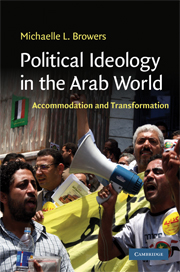Book contents
- Frontmatter
- Contents
- Acknowledgments
- Glossary
- Introduction: Ideological thought and practice in the Arab region
- 1 Retreat from secularism in Arab nationalist and socialist thought
- 2 A more inclusive Islamism? The wasatiyya trend
- 3 Framing a cross-ideological alliance
- 4 The Egyptian Movement for Change: Intellectual antecedents and generational conflicts
- 5 Yemen's Joint Meeting Parties: Origins and architects
- Conclusion: Ideological rapprochement, accommodation, transformation – and their limits
- Bibliography
- Index
- Cambridge Middle East Studies
3 - Framing a cross-ideological alliance
Published online by Cambridge University Press: 22 January 2010
- Frontmatter
- Contents
- Acknowledgments
- Glossary
- Introduction: Ideological thought and practice in the Arab region
- 1 Retreat from secularism in Arab nationalist and socialist thought
- 2 A more inclusive Islamism? The wasatiyya trend
- 3 Framing a cross-ideological alliance
- 4 The Egyptian Movement for Change: Intellectual antecedents and generational conflicts
- 5 Yemen's Joint Meeting Parties: Origins and architects
- Conclusion: Ideological rapprochement, accommodation, transformation – and their limits
- Bibliography
- Index
- Cambridge Middle East Studies
Summary
Much of the intellectual basis for development of cross-ideological alliances in the region has been provided by the works of Arab nationalist and leftist intellectuals who have increasingly looked to Islamic sources in their accounts of the Arab nation and the writings of various Islamists who have sought to present a more moderate and inclusive vision of Islam. In many respects, the members of these ideological groupings have been brought together by the imperatives of politics and history. Arab nationalists and leftists have sought to tap into the popular appeal Islamism seems to hold. Islamists have looked to Arab nationalists and leftists as allies in resisting the harassment and imprisonment of their members and in bypassing various restrictions on their political activity. Cooperation has been encouraged not only by domestic issues (such as closed political systems), but also regional issues (such as lack of progress in Palestine and increased US intervention in Iraq and other parts of the Gulf) and global issues (such as globalization and international anti-globalization activism). As noted in the previous chapter, “moderate” in the context of these political trends should not be mistaken for non-confrontational or pro-Western.
Interactions among the intellectuals discussed in the first two chapters have both contributed to – and been facilitated by – a series of forums, conferences, and dialogs that have enabled members of a wide variety of groups to develop personal relationships and mutual understandings, and which have proven pivotal in coordinating political activities in a number of contexts. The various forums are different in significant ways, revealing varying scopes (global, regional, and local) and distinct agendas and purposes. Some of the forums seem to have their origins in intellectual projects.
- Type
- Chapter
- Information
- Political Ideology in the Arab WorldAccommodation and Transformation, pp. 77 - 108Publisher: Cambridge University PressPrint publication year: 2009



